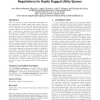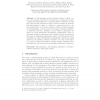20 search results - page 4 / 4 » Integrating individual and social intelligence into module-b... |
ATAL
2008
Springer
13 years 6 months ago
2008
Springer
In open societies such as multi-agent systems, it is important that coordination among the several actors is achieved efficiently. One economical way of capturing that aspiration ...
ATAL
2010
Springer
13 years 4 months ago
2010
Springer
There is a number of recent research lines addressing complex negotiations in highly rugged utility spaces. However, most of them focus on overcoming the problems imposed by the c...
ATAL
2003
Springer
13 years 10 months ago
2003
Springer
Abstract. A self-organising system functions without central control, and through contextual local interactions. Components achieve a simple task individually, but a complex collec...
ATAL
2005
Springer
13 years 10 months ago
2005
Springer
Just as POMDPs have been used to reason explicitly about uncertainty in single-agent systems, there has been recent interest in using multi-agent POMDPs to coordinate teams of age...
ATAL
2005
Springer
13 years 10 months ago
2005
Springer
The aggregation of conflicting preferences is a key issue in multiagent systems. Due to its universality, voting has a central role among preference aggregation mechanisms. Votin...


